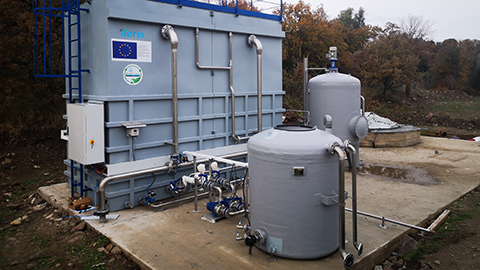Recovering non-conventional water sources to combat water scarcity

11/02/2021
The European Commission's circular economy action plan aims to implement innovative solutions to recover and reuse valuable resources, and water recycling is one of the priorities. Inspired by this trend, HYDROUSA is a research project that aims to recover water from unconventional sources and revalorize it through natural systems, thus also boosting the agricultural and energy side of the Mediterranean region from a local perspective. The project, funded by the EU, involves 28 partners from ten countries, is coordinated by the National Technical University of Athens (NTUA) and counts with the participation of the UAB spin-off AERIS.
This 2021 the project enters the most important phase because all innovation solutions are already developed and operational, and will now start to be tested. Over the next two years experiments will be conducted to demonstrate that circularity can be the solution to water scarcity, and at the same time is useful to boost sustainable agricultural development and biodiversity. The Greek islands of Lesvos, Mykonos and Tinos have six large-scale demonstration sites for sustainable, innovative and natural solutions for water treatment and management.
On the island of Lesvos, AERIS, a UAB spin-off created by experts from the GENOCOV research group (UAB), has developed and installed a system that will regenerate and valorize urban wastewater through anaerobic biological treatment. This treatment reduces the organic contamination of the water and also produces energy in the form of biogas. The water then completes its purification by means of a system of artificial wetlands. After a disinfection process, this water, rich in nutrients, will be used for the fertigation of an agroforestry system. The sludge produced in the anaerobic reactor will be composted and used as a fertilizer, and the biogas will be used to fuel a vehicle for dissemination purposes. "This is therefore a self-sustainable wastewater management system, where the water, nutrients and sludge produced are reused with significant environmental and economic benefits," explains Óscar Prado, director of AERIS.
On Miconos is developing optimized rainwater harvesting systems. In the small village of Ano-Mera, a remote agricultural area, a subway rainwater harvesting system is being tested. This water is used to irrigate a field of oregano, which is then revalued to produce essential oils. In another system, rainwater and surface runoff are collecting in the aquifer during the wet season, and are used for lavender production during the dry season.
Finally, on Tinos, natural and sustainable solutions are being sought to treat and recover valuable water and products. On the one hand, a natural desalination system based on the principles of evaporation and condensation is being tested, combined with a greenhouse to produce tropical fruits, which will be consumed locally. This system, based on mangroves, produces irrigation water and edible salt. An ecotourism facility has also been developed that features a self-sufficient water, energy and food management cycle.